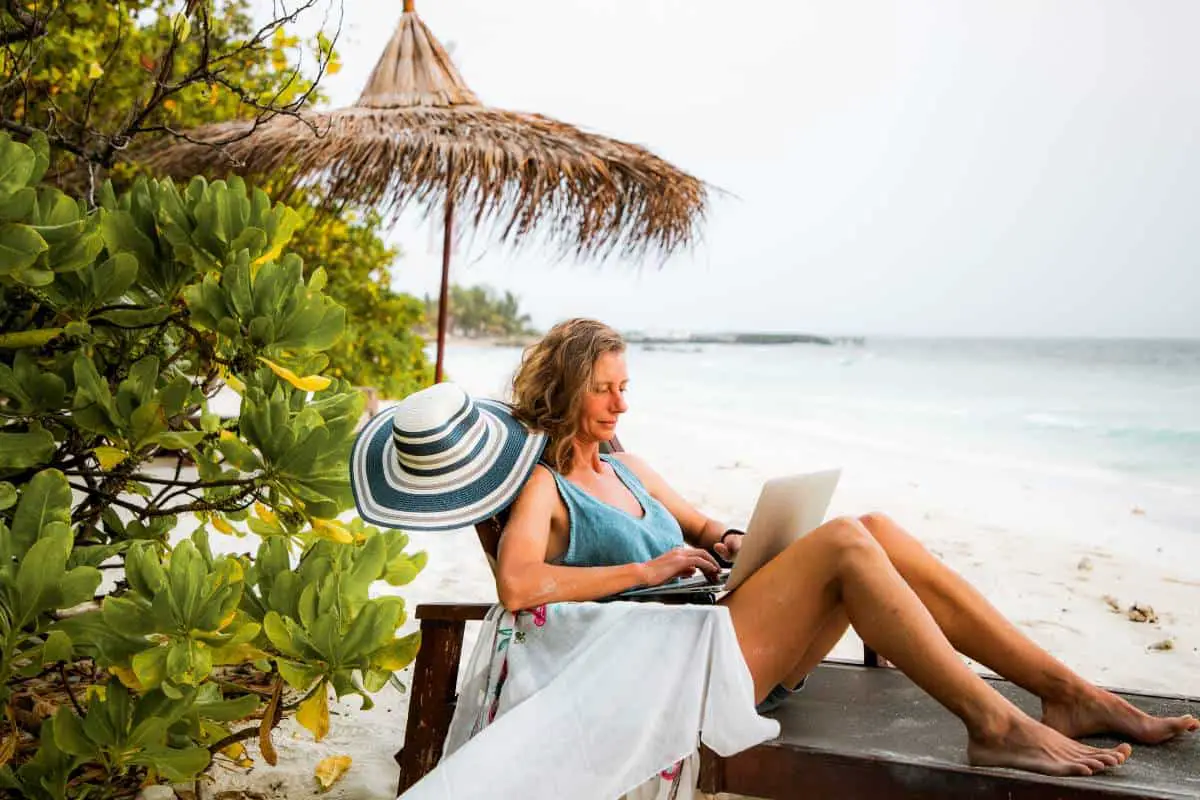Secure Your Visa For Digital Nomad Retirement In Thailand!
Tom Kitti here from BetterLivingAsia.com. After 35 years in the U.S., I took the plunge and moved to Thailand. According to a YouGov survey, 32% of digital nomads prefer working here, making Thailand one of Southeast Asia’s top destinations for remote workers. Now, I’m sharing insights on why Thailand is becoming a digital nomad paradise for retirees like me, with affordable living, rich culture, and new visa options that make long-term stays easier than ever. Let’s explore how you can make this dream your reality!
Key Takeaways
- Thailand offers a unique blend of affordability, culture, and quality of life for digital nomad retirees
- New visa options make long-term stays more accessible for remote workers and retirees
- Understanding local customs, healthcare, and tax implications is crucial for a successful transition
Thailand’s Digital Nomad Paradise: Retiring in the Land of Smiles
The digital nomad lifestyle has exploded in popularity, and Thailand has emerged as a top destination for those looking to blend work and retirement. With its stunning beaches, vibrant cities, and rich culture, the Land of Smiles offers an irresistible package for those seeking adventure in their golden years.
But it’s not just about the scenery. Recent changes in visa options have made it easier than ever for digital nomads and retirees to call Thailand home. One of the most comprehensive resources on this topic is Living and Working in Thailand: A Digital Nomad’s Experience, which provides valuable insights into making this transition.
Let’s dive into what makes Thailand such an attractive option for those looking to work remotely and retire in style this 2024.
Understanding Thailand’s Visa Options for Digital Nomads and Retirees
When I first considered moving to Thailand, navigating the visa landscape seemed daunting. But fear not! Thailand has been working hard to welcome digital nomads and retirees with open arms. Here’s a breakdown of the main options:
- Thailand Digital Nomad Visa / Long-Term Resident Visa: This new visa is a game-changer for remote workers. It allows for a stay of up to 10 years!
- Retirement Visa: If you’re over 50, this visa is your golden ticket. It’s relatively easy to obtain and perfect for those looking to fully embrace retirement within Thailand.
- Thailand Elite Visa: For those who want a hassle-free option and don’t mind spending a bit more, the Elite Visa offers perks like airport fast-track and concierge services.
- Tourist Visa: While not ideal for long-term stays, it’s a good way to test the waters before committing to a longer-term visa.
One of the most exciting developments is the O Visa, specifically aimed at retirees. As I mentioned earlier, if you’re over 50, this visa opens up a world of possibilities. To qualify, you’ll need to show financial stability – either through savings of $25,000 in your bank account or a monthly income of $2,000, or a combination of both.
Here’s a quick comparison of the main visa options available for digital nomads and retirees in Thailand:
Visa Options Comparison Table
| Visa Type | Duration | Requirements | Cost | Benefits |
|---|---|---|---|---|
| Digital Nomad Visa (LTR) | Up to 10 years | Income: $80,000/year or $40,000 bank savings | $600/year | Long stay, work remotely |
| Retirement Visa (O) | 1 year | Over 50, Savings: $25,000 or $2,000/month income | $100/year | Easy to renew |
| Thailand Elite Visa | 5-20 years | None (financially based) | $15,000+ | VIP services |
| Tourist Visa | 3-6 months | None | $40 | Short-term trial stay |
Cost of Living and Financial Considerations
One of the biggest draws of Thailand for digital nomads and retirees is the incredibly affordable expenditures. When I moved here, I was amazed at how far my retirement savings could stretch. Let’s break it down:
- Housing: Whether you’re in bustling Bangkok, laid-back Chiang Mai, or tropical Phuket, you’ll find options to suit every budget. A comfortable one-bedroom apartment in the city center can range from $300-$600 per month.
- Food: From world-class restaurants to mouth-watering street food, you can eat like royalty for a fraction of what you’d pay in the West. A meal at a local restaurant might set you back just $2-$5.
- Healthcare: Thailand is renowned for its excellent and affordable healthcare. A check-up at a private hospital might cost around $30-$50.
- Transportation: Public transit in major cities is efficient and cheap. A monthly pass in Bangkok costs about $30.
Pro tip: When budgeting for your move, don’t forget to factor in initial setup costs like deposits for apartments and possibly buying furniture. It’s also wise to maintain a buffer for unexpected expenses.
Let’s break it down further to compare the cost of living in Thailand versus the U.S.
Cost of Living Comparison Table
| Category | Thailand | U.S. |
|---|---|---|
| Housing (1BR Apt.) | $300-$600 | $1,500+ |
| Meal (Local) | $2-$5 | $12-$20 |
| Healthcare (Check-up) | $30-$50 | $150+ |
| Public Transit (Monthly Pass) | $30 | $80+ |
Working Remotely in Thailand
As a digital nomad in Thailand, you’ll find a thriving ecosystem that supports remote work. However, it’s crucial to understand the legal landscape:
- Work permits: Technically, even if you’re working remotely for a company outside Thailand, you may need a work permit. The rules can be complex, so it’s best to consult with a local expert.
- Co-working spaces: Cities like Bangkok and Chiang Mai are dotted with modern co-working spaces where you can network with fellow digital nomads, and also do some remote work in Thailand.
- Internet connectivity: In urban areas, you’ll find fast and reliable internet. I’ve had video calls with clients halfway across the world without a hitch!
Building a professional network is key. Attend local expat meetups or join online forums to connect with like-minded individuals. It’s not just good for business – it’s a great way to make friends too!

Thai Culture and Lifestyle for Digital Nomads and Retirees
Immersing yourself in Thai culture is one of the most rewarding aspects of living here. Here are some tips to help you adapt:
- Learn basic Thai language: A few simple phrases go a long way in winning local hearts.
- Respect local customs: Thailand is deeply respectful of its monarchy and Buddhist traditions.
- Embrace the food culture: From pad thai to som tam, Thai cuisine is a journey in itself.
- Join in festivals: Experiencing Songkran (Thai New Year) or Loy Krathong (Festival of Lights) will give you a deeper appreciation of Thai traditions.
Living in Thailand also means adapting to a tropical climate. The heat can be intense, especially if you’re coming from a cooler climate.
Stay hydrated, invest in lightweight clothing, and don’t underestimate the power of air conditioning! Living in Thailand without it is rough in many different ways.
Popular Destinations for Digital Nomads and Retirees
Thailand offers a diverse range of destinations, each with its own unique charm:
- Bangkok: The capital city offers a perfect blend of modern amenities and traditional culture. It’s ideal for those who love urban living.
- Chiang Mai: Known as the digital nomad capital of Thailand, it offers a more laid-back vibe with a lower cost of living.
- Phuket: If beach life is your dream, Phuket and other islands offer stunning coastlines and a relaxed atmosphere.
- Hua Hin: This coastal town is gaining popularity among retirees for its quieter pace of life and beautiful beaches.
Each destination has its pros and cons, so I recommend visiting a few before settling down. Remember, your ideal location might change as you spend more time in Thailand.
Healthcare and Wellness in Thailand
One of the most compelling reasons to choose Thailand for retirement is the excellent healthcare system. Over the last decade, Thailand has positioned itself as one of the world’s best medical destinations. In fact, according to the World Travel & Tourism Council (WTTC), Thailand ranks as the fifth-best country for inbound medical tourism.
Here’s what you need to know:
- Private hospitals: Many offer world-class care at a fraction of Western prices.
- International clinics: You can often find English-speaking doctors and staff.
- Traditional medicine: Thai massage and herbal treatments can be excellent complements to Western medicine.
Don’t forget about mental health resources. Moving to a new country can be challenging, and it’s important to take care of your emotional well-being too. Many cities have counselors and support groups for expats.
Here’s a comparison of healthcare costs between Thailand and the U.S.
| Aspect | Thailand | United States |
|---|---|---|
| Healthcare Spending (2021) | 6% of GDP | 17% of GDP |
| Per Capita Healthcare Expenditure | Significantly lower (4x less than the U.S.) | Highest among 40 countries in the Index |
| Universal Healthcare | Yes (since 2002) | No (Insurance-based system) |
| Cost of General Check-up | $30-$50 | $150+ |
| Healthcare Workforce Density | Lower (Rank 26 for nurses, Rank 21 for pharmacists) | Higher (Rank 2 for nurses, Rank 11 for pharmacists) |
| Legal Right to Healthcare | Yes (Healthcare as a human right in the Constitution) | No (Focus on the right to insurance) |
| Inclusivity in Health Policies | Strong coordination across sectors (National Health Assembly) | Limited, no central oversight for inter-agency coordination |
| Access for Low-Income Populations | Universal access; free healthcare for indigent citizens | Depends on insurance and Medicaid eligibility, varies by state |
| Health as a Priority | Ranked 1st in Health in Society | Lacks legal framework for health as a human right |
| Ranking in Global Health Index | 9th | 11th |
Tax Implications for Digital Nomads and Retirees
Understanding your tax obligations is crucial when living abroad. Here’s a quick overview:
- Thai tax residency: If you stay in Thailand for 180 days or more in a calendar year, you’re considered a tax resident.
- Foreign income: Thailand generally only taxes income derived from Thai sources or brought into the country in the same year it’s earned.
- US tax considerations: As a US citizen, you’re still required to file US taxes. However, programs like the Foreign Earned Income Exclusion (FEIE) can help reduce your tax burden.
I highly recommend consulting with a tax professional who specializes in expat taxes. They can help you develop strategies to optimize your tax situation and ensure compliance with both Thai and US laws, especially the Thai government.
Building a Community: Social Life for Digital Nomads and Retirees
One of my initial concerns about moving to Thailand was whether I’d feel isolated. I’m happy to report that building a vibrant social life here is easier than you might think!
- Join expat groups on Facebook or platforms like Meetup.com
- Attend language exchange events to meet locals and practice your Thai
- Volunteer for local charities – it’s a great way to give back and make connections
Integrating with the local community is key to truly experiencing Thai life. Don’t just stick to expat circles – make an effort to form friendships with Thai people too.
Practical Considerations for Long-Term Stay
Living in Thailand long-term requires some practical know-how:
- Opening a Thai bank account: This can be tricky but not impossible. Bring all your documentation, including your visa and a letter from your embassy.
- Renting property: Long-term rentals are generally more cost-effective than short-term stays. Always read contracts carefully and consider hiring a translator if needed.
- Transportation: In cities, public transit is efficient. For more flexibility, consider renting a motorbike (but be sure to get proper insurance and always wear a helmet!).
- Visa compliance: Stay on top of your visa requirements, including 90-day reports for some visa types.

Environmental Considerations and Sustainable Living
As visitors to this beautiful country, it’s our responsibility to minimize our environmental impact. Consider:
- Choosing eco-friendly accommodations
- Using reusable water bottles and shopping bags
- Supporting local, sustainable businesses
Many digital nomad communities in Thailand are leading the charge in sustainable living practices. Join them and be part of the solution!
Future of Digital Nomadism in Thailand
The future looks bright for digital nomads in Thailand. The government is increasingly recognizing the value that remote workers bring to the economy. We can expect:
- More tailored visa options for digital nomads
- Improved digital infrastructure, especially in smaller cities
- Growth in co-living spaces and digital nomad-friendly accommodations
As Thailand continues to evolve, it’s an exciting time to be part of this vibrant community.
FAQs
What are the income requirements for Thailand’s digital nomad visa?
The exact requirements can vary, but generally, you’ll need to show a stable income of around $80,000 per year or $40,000 in your bank account.
How does the cost of living in Thailand compare to Western countries?
Thailand is significantly more affordable. You can live comfortably for about 30-50% of what you’d spend in the US or Western Europe.
What healthcare options are available for expats in Thailand?
Thailand offers excellent private healthcare at affordable prices. Many expats opt for international health insurance for comprehensive coverage.
How can I extend my stay in Thailand beyond the initial visa period?
Depending on your visa type, you may be able to extend at a local immigration office. Some visas require you to leave the country and re-enter.
What is the process for opening a Thai bank account as a foreigner?
You’ll typically need your passport, visa, proof of address in Thailand, and sometimes a letter from your embassy. Requirements can vary by bank.
Conclusion
Thailand offers a retirement lifestyle unlike any other — one filled with adventure, cultural richness, and affordability. If you’re ready to move beyond uncertainty and embrace a life of confident independence, the opportunity is waiting for you.
Living in Thailand as a digital nomad retiree has been one of the most rewarding experiences of my life. The blend of modern amenities, rich culture, and affordable living creates a unique environment where you can truly thrive in your golden years.
Ready to take the next step? Message us if you have any questions! We’re here to help you in any way we can.


![Visa Types For Thailand [Thailand Visa Application] Visa Types For Thailand](https://betterlivingasia.com/wp-content/uploads/visa-types-for-thailand-3-768x512.jpg)
![Thailand Elite Visa Program [Pros & Cons] Thailand Elite Visa Program](https://betterlivingasia.com/wp-content/uploads/2022/10/Thailand-Elite-Visa-Program-1-768x509.jpg)